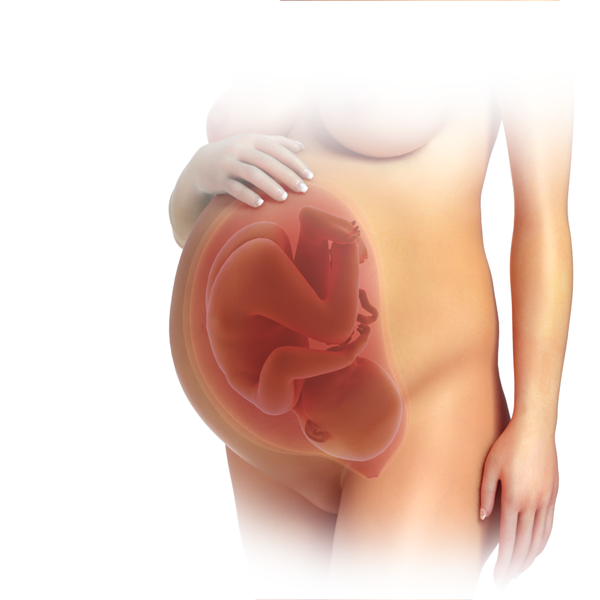Week 39: Time to think about not worrying about how big your baby is. Most healthy babies are born between 6-9 pounds.

-
Many women who report coping well in labor used rhythmic movements or rhythmic breathing as part of their coping style. Keeping a rhythm, with your body movements or with your breath can keep you "on top of" the pain instead of getting pulled down into it.
Penny Simkin
-
Some women will experience a resting period, where contractions slow down or stop between the laboring stage and the pushing stage of their baby's births. If you experience a lull in labor, don't worry that your labor is stuck. Use that time to rest and be thankful for the moment of peace before your contractions return, usually with a renewed intensity.
-
If you lose more than the normal amount of blood during birth , it's doubly important that you rest and eat very well after baby arrives. Increase your daily calories by 100 - 500 per day and include protein-rich foods.
-
Unless you have essential or gestational diabetes, don't worry about growing too big a baby. Healthy babies tend to weigh around 8 pounds.
-
Once your baby is born, expect to lose about six pounds of water weight within the first two weeks. Expect night sweats and increased peeing. Keep drinking to thirst. The better your hydration, the more easily your body will release the excess fluid within your tissues.
-
It's normal to experience emotional highs and lows in the first two weeks postpartum. Your body's natural and normal hormonal shifts are responsible for you feeling weepy and ecstatic at the same time. Termed the "baby blues", this period usually finishes within two-three weeks of your baby's birth and is not a sign of postpartum mood disorder.
Postpartum Support International
-
Postpartum mood disorder is a serious condition that requires immediate recognition and treatment by mother, partner and care providers. PPMD can occur anytime within the first year after baby's birth with onset most common between 2-6 months postpartum. If mother is feeling sad, isn't her usual self, is sleeping too little or too much, eating too little or too much and is seriously unhappy with a flat affect, contact her health care provider immediately to seek the best treatment options for her. The quicker PPMD is recognized and treated, the quicker mother can begin feeling better.
Postpartum Support International
BirthWatch Recommends:
Heart and Hands: A Midwife's Guide to Pregnancy and Birth
This is a really cool book for understanding how a homebirth midwife works. It's a little technical but each chapter has a special section for parents to help understand the choices and information detailed in that chapter.
